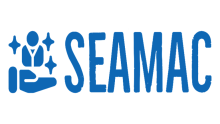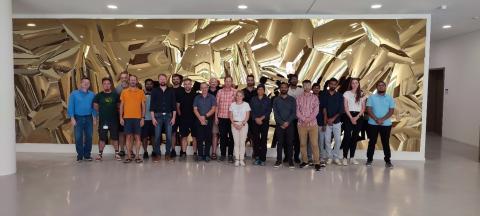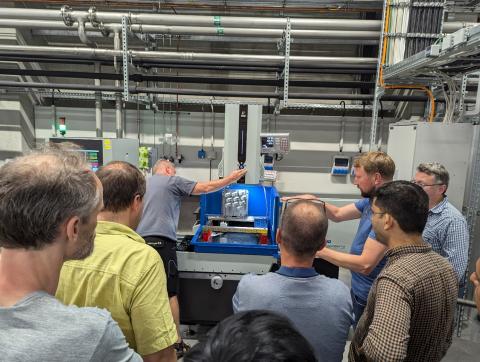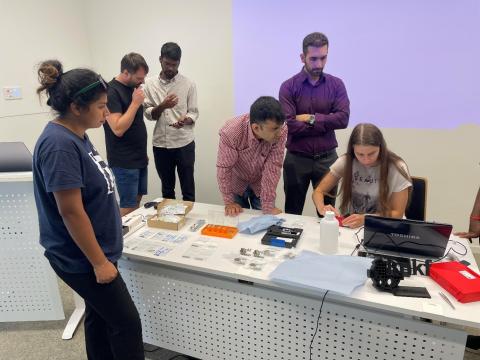SEAMAC - Strengthening the Excellence of Additive Manufacturing
Additive manufacturing (AM) has the potential to drive novel industry development as well as to transform current industries, but exploiting it to the fullest requires professionals with advanced degrees who have received the highest-level training in both technical and non-technical competences. The University of Ljubljana has expertise in the direct laser deposition (DLD) process, but has several weaknesses in the areas addressed in the SEAMAC project, including material behaviour especially to master the manufacturing of functionally graded materials and to perform postprocessing of AM parts to improve surface roughness. Hence, leading scientific institutions, namely Technion - Israel Institute of Technology and Technische Universität Bergakademie Freiberg take part in the consortium. The former brings expertise in material science and the latter the knowledge on plasma electrolytic polishing. Both institutions are very active in the AM field, have a lot of cooperation with industrial partners, and are skilled in research management. The project activities encompass technical and non-technical cooperation and exchange of knowledge through the workshops and organisation of summer schools.
Research focus
- Metal additive manufacturing
- Functionally graded materials
- Post processing
- Plasma electrolytic polishing (PeP)
- Directed energy deposition (DED)
Project partners
University of Ljubljana [Slovenia]
Technical University Bergakademie Freiberg [Germany]
Technion - Isreal Institut of Technology [Israel]
Project duration
01.01.2023-31.12.2025

Main contact
Prof. Dr.-Ing. Henning Zeidler
+49 3731 39 3066
additive_fertigung [at] imkf [dot] tu-freiberg [dot] de (additive_fertigung[at]imkf[dot]tu-freiberg[dot]de)
Researcher team
Dipl.-Ing. Toni Böttger
Dr. Neel Kamal Gupta
Dr.-Ing. Stefan Krinke
Dr. Deeksha Lohani
Dr. Kristina Navickaite
Prof. Alexander Gromov
Dipl.-Ing. Martin Krinke
Work Packages
WP1 Knowledge and skills acquisition to technical advancements in metal AM
The WP covers broader knowledge and skills required to master process chains of metal AM manufacturing and postprocessing and will provide a background knowledge for the execution of exploratory research project (WP2). The objectives are:
• Mastering the metal AM process chains • Co-supervision of a PhD student in the field of powder blends, LMD, and characterisation
• Co-supervision of a PhD student in the field of DED and post-processing.
WP2 Exploratory research project
The overarching WP goal is to define the process chain for fabrication of parts from FGMs, thus defining powder mixtures DED and PeP process parameters for building structures of high-performance material (maraging tool steel) on cast iron. This will be achieved through:
• Preparation of powder blends for buliding high-quality layers of maraging tool steel on cast iron;
• Definition of process parameters of DED for manufacturing;
• Determination of process parameters and electrolyte composition for post-processing by PeP;
• Metallurgical and mechanical characterisation of manufactured demonstrators.
WP3 Training as a driver of excellence
The overreaching goals of WP4 are to increase the research excellence and innovation capacity of UL in the field of AM and to improve training on AM that aligns with industry needs at the highest academic levels, focusing on material blends, DED process and PeP post-processing. This will be achieved through:
• Technical knowledge transfer through virtual trainings, on-site training, staff exchanges, expert visits, joint summer schools;
• Non-technical knowledge transfer through predefined and ad hoc virtual meetings, on-site training including job shadowing focused on research management including technology transfer and IPR and project administration including financial reporting.
WP4 Dissemination, exploitation, and communication
One way to ensure the long-term benefits of SEAMAC is to increase collaborations with the industry. It is expected that the results of increased research excellence and widened communication activities will attract the commercial interest of industry, thus enabling sustainable growth of the AM field after the project end by:
• Knowledge management and protection while implementing ERA priorities of optimal scientific knowledge circulation, access and transfer;
• Strengthening links to existing and potential AM users through industry-oriented workshops and collaboration agreements;
• Building a strong communication and collaboration network;
• Raise awareness of the project among key stakeholders, including research and academic community, targeted industries, policymakers/regulators, primary and secondary education schools, and the general public.
WP5 Project Management and Coordination
This WP will ensure a timely, effective, and successful delivery of the project by providing a high level of administrative, contractual, financial, and managerial support. The main objectives are:
• Ensuring deliverables and milestones are met, and the project stays on time and in budget;
• Lead reporting of results and ensure close collaborations;
• Help evaluate the progress of the individual WPs;
• Organise and chair project meetings;
• Help to resolve conflicts, manage risks, and take necessary corrective actions (with the support of Coordinator and SC, if necessary);
• Manage the project’s relationship with the European Commission by ensuring that all the required documentation is completed on time and to the highest standard.


HORIZON Coordination and Support Actions
Topic: HORIZON-WIDERA-2021-ACCESS-03-01
European Research Executive Agency
Funded by the European Union. Views and opinions expressed are however those of the author(s) only and do not necessarily reflect those of the European Union or REA. Neither the European Union nor the granting authority can be held responsible for them.



